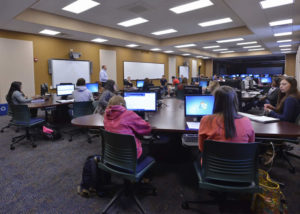Frequently Asked Questions – Academics
Advisement Center
How do I know who my Advisor is?
You can find your advisor in your Student BannerWeb account, under “My Registration Status.” If you don’t see anyone listed, please let us know! We’re happy to help you connect with an advisor from your major.
What are my advisor’s responsibilities? What are my responsibilities?
Your advisor is responsible for giving you up-to-date information about the requirements for your degree program and for reviewing and approving your course selections. Typically, your advisor will issue you your Registration PIN for the upcoming semester, when they approve your course selections. You will need your PIN to register for classes through BannerWeb on your assigned registration date.
You are responsible for requesting and scheduling meetings with your advisor. Plan to bring information with you from your Degree Works, a list of courses you’d like to take in the next semester, and any questions you have about your degree or registration. You should make an appointment to see your academic advisor when you receive your Gear Up for Registration email to plan for next semester, when you have questions about academic policies and procedures, or when you need help.
You are also responsible for checking your WCSU email frequently, so you don’t miss important information shared with you from your department, Enrollment Services, and many other important university offices.
If you have a scheduling conflict with your advisor’s schedule, reach out to your Department Chair for assistance. If you don’t know who your Department Chair is, let us know! We are here to help!.
When and how should I make an appointment to see my advisor?
Each advisor and department will handle things differently. It is important to reach out to your advisor early in the semester to learn how they set up appointments with students. Common ways advisors set up appointments are by email, phone, in person during office hours, or even by signing up on a sheet outside their office or department door.
Do I have to see my advisor to register for classes, even if I know what I want to take?
Yes! You must schedule an appointment to see your advisor prior to registration to ensure that you’re taking courses that fulfill your requirements. Also, you will need your registration PIN for registration even if you’re attempting to register in person at the Registrar’s Office, or online using BannerWeb.
Adding a Course
When and how can I add a course?
The add/drop period is held during the first six business days of every fall and spring semester. Students can make adjustments to their schedule during this time as necessary.
To add courses, you must complete your request before the end of the 6th business day of the semester. Any requests later than the first week of classes will require the approval of the instructor and department chairperson. Added courses that result in an overload (more than 17.5 credits) also need the approval of the dean.
For more information go to: https://www.wcsu.edu/registrar/forms/
Appealing a Grade
How do I appeal my final grade?
For more information, please refer to the Grade Appeal Policy.
 Attendance/Performance
Attendance/Performance
Is there a ‘cut limit’ at WCSU? What if the course is easy for me and I can get by just by studying someone else’s notes and the text?
You’re talking about attendance, right?
Western Connecticut State University is a non-attendance-taking institution but is required under federal law to report when a student has stopped attending classes. Faculty will report when a student has either never attended a class or when a student has stopped attending a class. Students must be aware that failure to attend class may result in being dropped for non-attendance and this may impact their student financial aid. Students who stop attending class and do not notify the Registrar’s Office will be responsible for 100% of the tuition until they have completed the necessary withdrawal paperwork. If a student has either dropped or withdrawn from all their courses, they will be considered withdrawn from the institution and may be required to apply for readmission.
You should also be aware that each instructor designs attendance regulations for his or her classes and will announce them at the beginning of the semester. You have to meet those requirements or risk failing the course. Most instructors regard good attendance as additional evidence of a student’s progress, and a number of them do not give top marks to students who only show up for the minimum number of classes, even if exam scores are high. Preparation and participation are also key. The university expects students to spend about two hours on preparation for every one hour of class, which is pretty much the norm for all colleges. The fact is, even if the course is tough for you, if you show up and show this kind of effort, it may well be the difference between passing and failing.
Contacting a Professor
How do I get in contact with my professor outside of class?
Professors usually list their contact information on the top of their syllabus which is handed out on the first day of class. Many professors post office hours online or outside their office door. You could either call your professor, email, or stop by the office during office hours. If you are still having difficulty contacting the professor, call or see the department secretary. The secretary can provide you with the contact information from the syllabus or forward a message on your behalf. A list of department secretaries and their contact information is provided in this handbook.
Dean’s List
What are the criteria for making the Dean’s List?
The answer is easy: hard work. Complete 12 standard-graded semester hour credits with at least a 3.5 average GPA (those three A’s and that tag-along B, or 2 A-minuses and two B-pluses, etc.). Do it in a single semester if you are a full-time student, or in one academic year if you are part-time. All work must be completed at the time grades are officially posted to the student’s academic record. For more information refer to the WCSU website at https://www.wcsu.edu/registrar/policies/
 Dropping a Course
Dropping a Course
Is withdrawing from a course the same as dropping it?
No, although you must notify the registrar and your instructor when withdrawing from, as well as dropping, a course. You can drop a course during the first week it is offered and it will not appear on your transcript. Dropping the course without replacing it, however, may cause you to lose full-time status (less than 12 semester hour credits, meaning you are not taking enough credits). In that case you must change your status from full-time to part-time, or you must request to withdraw from that course, which will then appear on your record with a grade of W. Be aware: financial aid, housing, and your insurance may be impacted by any negative change in your course-credit status. For more information about dropping a course, refer to https://www.wcsu.edu/registrar/forms/. For more information about withdrawing from a course, refer to https://www.wcsu.edu/registrar/faq
Final Exams
What if I can’t make it to the final exam?
Connecticut State University System rules state that final examinations (cumulative examinations) may be given only in the time period scheduled for such tests. That’s a pretty unbendable rule, so make sure you don’t make unwise plans, like unchangeable plane reservations. Other types of tests may be given throughout the term, but that’s a call your instructor must make.
GPA
How do I compute my overall Grade Point Average?
Listed below are the number values derived from your grades. Your grade point average is calculated based on these values and the number of credits earned. It’s true — the GPA you earn by graduation will follow you wherever a college degree really matters!**
| A | 4.0 | C- | 1.67 | P | Pass on Pass/Fail Option |
| A- | 3.67 | D+ | 1.33 | FP | Fail on Pass/Fail Option |
| B+ | 3.33 | D | 1.0 | W | Officially Withdrawn |
| B | 3.0 | D- | .67 | WF | Withdrawn Failing |
| B- | 2.67 | F | .0 | WFP | Withdrawn failing from a Pass/Fail course |
| C+ | 2.33 | AUD | Audit | RM/RP* | Given in specified courses to permit you to |
| C | 2.0 | INC | Incomplete | improve competence without academic penalty |
*Courses in which the RM or RP grade is allowed to be given:
CHE 100, COM 160/161/162, FR 162/164, GER 162/164, IT 162/164, MAT 100/100P, PHY 110/111, SPA 162/164, WRT 101/101P
**For a more detailed explanation of the above and other letter grades, consult the current undergraduate catalog, available at wcsu.edu/catalogs/undergraduate/academic-services-procedures/ section entitled Grades, Honors and Good Standing.
 Graduating with Honors
Graduating with Honors
What does “Graduating with Honors” mean?
The following universally recognized honors are conferred upon graduating seniors who achieve them by earning the grade-point average required. (All students must have earned a minimum of 30 credits at WCSU to be considered.) Graduation honors for the Commencement program are based on credits earned and your cumulative GPA at the end of the fall semester.
Summa Cum Laude – 3.9 to 4.0
Magna Cum Laude – 3.7 to 3.89
Cum Laude – 3.5 to 3.69
Guidelines on Classes Missed Because of University-Sponsored Events
What happens if one of my games or concerts is scheduled during my class time?
 There is not one answer. Please read the guidelines by the University Senate below:
There is not one answer. Please read the guidelines by the University Senate below:
Each semester students and professors must deal with the inevitable conflict between class and university-sponsored co-curricular activities. As the university grows and the student body becomes more diverse, it is clear that student activities outside the classroom will continue to increase. It is the purpose of these guidelines to spell out the relationship between the two activities, and to suggest a way of accommodating any potential conflict between the two.
It is the responsibility of all students to recognize that meeting the requirements of all classes is their first priority. It is the student’s responsibility to communicate with their professors before a conflict occurs, if possible, to ensure that all classroom work is properly made up. It is also the student’s responsibility to make up all required work as well as to become familiar with the material presented in the class that was missed.
By definition, university-sponsored events are legitimate, co-curricular events that are scheduled through a university department or entity, with adequate notice to all parties. For example, participation in a sports contest or a museum trip for the university would be such an event, but attending a practice session would not. It is requested that faculty members understand the depth of the students’ commitment, allow reasonable accommodation of student activities and permit work missed because of legitimate university events to be made up. To download the Missed Classes Form go to: https://www.wcsu.edu/student-affairs/forms/. This form was approved by the University Senate at the 10/20/2004 Senate meeting and is the correct form to use.
Leave of Absence
I am no longer able to concentrate on my studies and need to take a break. What do I do?
If you find you have to leave school for a period of no more than one year, you can apply for a leave of absence. It’s similar to withdrawing from the university, but it means you may return and resume your studies without having to formally re-enter the university. Students interested in applying for a Leave of Absence should complete the forms with a representative from the Registrar’s Office. One-semester leaves may be extended with the permission of the dean but approval of the extension must be secured before the original leave time has lapsed. Forms are available in the Office of the Registrar or online. For more information refer to: https://www.wcsu.edu/registrar/faq and the Registrar’s Forms page at https://www.wcsu.edu/registrar/forms/
 Libraries
Libraries
What are the basic borrowing rules at WCSU’s libraries?
Guidelines for borrowing materials at the libraries:
-
- You must have a current Connecticut State Colleges and Universities (CSCU) ID card to borrow books, reserve materials
- The CSCU Library System (WestSearch) online catalog is available at http://library.ct.edu/wcsu. Periodical and research databases are available from http://libguides.wcsu.edu/databases
- Users may borrow circulating materials from all other CSCU libraries and have them delivered to the Haas library.
- Circulating materials borrowed at one location may be renewed or returned at the Haas library or at any of the other CSCU libraries. Reserve material must be returned to the lending library.
- Books may be renewed online by going to the library’s <My Library Account> link in WestSearch.
- Books and media circulate for 28 days, unless requested by another user, and may be renewed once for an additional 28 days.
Is library information available from off-site locations?
The libraries provide 24/7 virtual access to a wide variety of databases that furnish full text access to thousands of ebooks, journals, magazines, newspapers, art images, music, and streaming video. These resources can be found on the library webpages and can be accessed on or off campus using your university Windows ID and password.
Midterm Grades
When do midterm grades come out?
The first grade report comes approximately nine weeks into the semester. These midterm grades don’t show permanently on your transcript, and they don’t factor into your GPA — but they do reflect the progress you are making in each class. If you’re running a D, F or INC, that’s a warning! You need to see your instructor about getting help. Or talk to your advisor. You might want to think about withdrawing from that class – but remember, financial aid, housing, health insurance, etc., may be impacted by any negative change in your course-credit status. The important thing to remember is that a D, F or INC grade at midterm is a red flag and is the time to make a change through your instructor, advisor, Academic Advisement or any WCSU faculty or staff member who you feel comfortable approaching.
Plagiarism & Cheating
What exactly is plagiarism?
For more information, see the Academic Honesty Policy.
Registration
What happens if I accidentally register for classes that overlap or are on different campuses?
Our system is set up to let you know if classes you are trying to register for overlap but it will not warn you if you are registering for classes on different campuses. Pay special attention to the following building codes:
BR – Berkshire Hall, Midtown campus
CC – Campus Center, Westside campus
HI – Higgins Hall, Midtown campus
HL – Haas Library, Midtown campus
KH – Kathwari Honors House, Midtown campus
ON – O’Neill Center, Westside campus
SB – Science Building, Midtown campus
SC – Student Center, Midtown campus
VPA – Visual & Performing Arts Center, Westside campus
WA – Warner Hall, Midtown campus
WH – White Hall, Midtown campus
WS – Westside Classroom Building, Westside campus
Off Campus Sites:
WE – Ekstrom Hall, Waterbury
WF – Founders Hall, Waterbury
WK – Kinney Hall, Waterbury
WSC – NVCC Student Center, Waterbury
WT – Technology Hall, Waterbury
NW – West Campus, Norwalk CC
Campus Codes:
M – Midtown Campus, 181 White Street
W – Westside Campus, 43 Lake Avenue Extension
OU – Online Undergraduate; OG – Online Graduate; OD – Online Doctoral
NW – Norwalk, NCC Campus
WB – Waterbury, NVCC Campus
WN – Winsted, NCCC Campus
Days of the Week:
M – Monday T – Tuesday W – Wednesday R – Thursday F – Friday S – Saturday
Make sure you have enough time between classes to get from one campus to the next (you should plan at least 30 minutes between Midtown and Westside). Do not register for a class in Waterbury if you have no way of getting there.
Registration PIN Numbers
How do I get my Registration PIN Number? When do I register?
Check your WCSU email account regularly for registration information.
- Log into WestConnduit to find out who your advisor is and the earliest date you can register. Click on the Banner tab and select “Check Registration Status.”
- Make an appointment with your advisor one to two weeks in advance of your registration date. Find out when their office hours are and either stop by or email/call ahead to make an appointment. Don’t forget to leave your contact information.
- Look at Degree Works and pick a potential schedule for next semester using Open/Close. Once you pick courses, you can enter those in the “What-If” function of Degree Works to ensure they will fulfill your degree requirements.
- Bring the tentative schedule when you see your advisor.
- Discuss your choices, follow your advisor’s advice, get your PIN number (Remember: this PIN number changes every semester.)
- Register online for the classes your advisor recommends.
 Satisfactory Academic Progress (SAP)
Satisfactory Academic Progress (SAP)
What is Satisfactory Academic Progress?
Students receiving financial assistance under the federally supported Title IV Programs must comply with a set of standards to be eligible for such assistance. Satisfactory Academic Progress (SAP) is an assessment of your cumulative academic record at WCSU and is measured on a per-term basis. This policy is separate and apart from other academic policies at the university.
There are three components measured and weighed in determining SAP to ensure successful completion of a degree within a timeframe consistent with federal regulations.
Students applying for financial aid must maintain status as a matriculated graduate or undergraduate. Matriculated students are evaluated for Satisfactory Academic Progress based upon qualitative and quantitative standards, as well as a Maximum Timeframe standard.
Students who enroll in the Fresh Start program will only have the credits retained and new GPA as calculated by Fresh Start included in the determination of their SAP status for the re-entry term.
Financial Aid Programs Affected by Satisfactory Academic Progress
SAP is required for all Title IV funds, state, university and some alternative loan programs including, but not exclusive, to the following:
- Federal Pell and Supplemental Educational Opportunity Grants (SEOG)
- Federal Loans: Perkins; Direct Subsidized/Unsubsidized; Direct Parent/Graduate PLUS
- Federal Work Study Program
- Roberta B. Willis Scholarship
- Connecticut State University Grant
- State scholarship and grant programs
There are several areas on campus for which SAP is important, and they include financial aid, housing, and athletics. Please familiarize yourself with each area’s individual SAP requirements by looking at their webpages.
For more information on SAP, visit wcsu.edu/finaid/policies/academic-progress/ or contact our office.
 Study Skills
Study Skills
My study skills are not great. I’m not good at note-taking in history or English, and I’m clueless about math — and I have a major math exam coming up!
There’s a lot of that going around. The cure is simple: go to one or all of the three professionally-staffed centers that provide guidance and instruction to students who need help in specific subjects or who just want to get some really effective studying techniques.
The centers are located in the Haas Library (Writing Center and Tutoring Resource Center) and Higgins Hall (Math Clinic) and are open weekdays, selected evenings and, when possible, weekends. Students work one-on-one with staff or student tutors in a friendly, supportive atmosphere. You can also choose to work independently on computers or form small study groups. Call or come by the centers to find out how they work!
The opens in a new windowMath Clinic (Higgins Hall 108) is run by the mathematics department. It is a traditional math tutoring center, where knowledgeable, helpful, and friendly student-tutors assist their fellow students with homework problems, projects, and preparing for quizzes or exams. The tutors in the clinic are there to support the needs of students taking undergraduate mathematics courses. Occasionally tutors will try to help students with general math questions in non-mathematics classes, but this is not their primary purpose or expertise. In general, the tutors may be helping groups of students in a variety of courses. Note that tutors will not help with take-home exams and other forms of assessments that must be completed by the individual student.
The Tutoring Resource Center (TRC) on the 2nd floor of the Haas Library (203-837-9245) offers FREE 1-1 peer tutoring in a variety of subjects in the Arts & Sciences, Professional Studies, and Visual and Performing Arts. Our peer tutors are available to help students understand difficult concepts, learn effective study strategies, and master course content in a supportive and stress-free environment. The TRC also serves as an open study space to work independently or form study groups. For students needing support with general study skills, time-management, organization, and motivation, the TRC also offers Peer Academic Coaching by appointment. Students can view available appointments and learn about the TRC on our website.
In the Writing Center (Haas Library 302), students can receive free assistance with writing for any class or outside writing project. The Center’s undergraduate and graduate student tutors offer guidance in all aspects of writing, from brainstorming and organization to editing and polishing. No initial draft is required. Students may walk in for help or use the website to schedule an in-person or online appointment
Withdrawing from a Course
How do I withdraw from a course? Just quit going to class?
Absolutely NOT. You must withdraw formally or you will receive an “F” for the course. First, check with the registrar to see if it’s not too late to withdraw, then submit the necessary documentation. wcsu.edu/registrar/faq.Tell your instructor you are withdrawing — and, if you haven’t consulted your advisor yet, it would be smart to let him/her know, too. Never just quit going to class!

